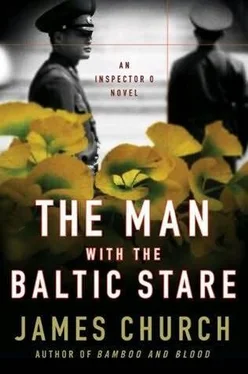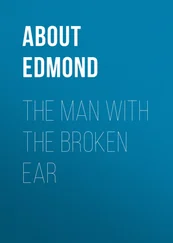“Do you like Chinese opera, Inspector? I can’t stand it. The spectacle is tolerable; at least the costumes are a distraction from the noise. But a recording? I wouldn’t even want to saw boards to it.” He must have realized his mistake immediately, because he reached in his pocket and pulled out a small, paper-thin piece of wood.
“I understand you are much attracted to trees. This is a piece of white birch, from a forest near Harbin. Mean anything to you?”
“As your research has obviously discovered, my father was born in Harbin.” Pang had done his homework. This was his way of telling me that he could step into my life and rearrange it any time he wanted. He didn’t care if I despised him for it, as long as I understood.
Major Su walked over and took away the teacups. Pang waited until she had disappeared inside the white building. “If you look carefully, you’ll see that on the piece of wood is a phone number. The digits are quite small and rather faint, but you should have no trouble making them out. If you see or hear anything in Macau that has a bearing on the fate of your country, call me. Tell the person who answers that you owe me money. They will put you through to me immediately, any time night or day.”
Major Kim had told me to make sure that the evidence in Macau pointed “elsewhere.” When I asked what the evidence was, he told me that was for me to find out. When I asked how bad it was, he said very simply, “Bad.”
“There wasn’t time to set up your trip through the normal contacts,” he said just before I left for the airport. “You may run into interference here and there. I’ll keep doing what I can to smooth things out from this end, but mostly you are on your own.”
“Do I have a number to call in case of a real emergency?”
“No.” Kim spread his hands. “Nothing. It’s not that sort of assignment. You’ll have to deal with things as they come up.”
“Do you know me if something goes wrong?”
“What do you think?”
“About the passport.”
“What about the passport?”
“I need something else.”
“You may as well get used to carrying ROK documents, Inspector. Besides, on such short notice, even if I wanted to, I couldn’t come up with anything else. Don’t worry; you won’t die simply from handling it.”
I wasn’t worried about a dread illness. I was worried about the entry stamps-they didn’t look right. If they don’t look right, even for a moment, they get a second glance from Immigration. And if they got a second glance, it usually meant having to answer a lot of questions in a hot room. I had that happen in Copenhagen once, and I didn’t plan to go through it again. Some Danes are very persistent. I could see Kim wasn’t going to budge, though, so I moved on. People can be stubborn about passports, even phony ones. “What about emergency funds?”
“You have all you’ll need.”
“There’s not very much in this little envelope.”
“There never is. I don’t have more to spare. Be thankful you have an airline ticket and a hotel reservation. If you pay anything out of pocket, you’ll be reimbursed, though it takes forever.”
“How about advice? That’s free.”
“Stay away from your own people in Macau. They’re all over the place, and they won’t know you’re there. At least, they’re not supposed to know. Don’t wink or nod or give a secret handshake to anyone. Stay out of Korean restaurants. I don’t know who stands where on what issue, and we don’t want to find out the hard way.”
“You mean they don’t know what’s going on here?”
Kim shrugged. “Hell, Inspector, I don’t even know most of the time.”
We laughed. Neither of us thought it was funny.
My plane landed in Hong Kong around five o’clock on a muggy afternoon. I waited around in the airport for a couple of hours until the ferry left for Macau. We pulled up to the dock around eight at night; it was so humid that the raindrops were sweating. The immigration officer was bored, but not so bored that he didn’t look at every page in my passport. Then he did it again, this time flicking each page with a sharp click, letting me know he wasn’t fooled one little bit by all the travel that never happened. Finally, he stamped it wearily, unwilling to make an issue of what he knew could not be easily dismissed. He handed it back, never looking at me, as one might not look at a bag of garbage dropped at the front door.
When I gave the cabdriver the piece of paper with the hotel’s address, he studied it for a long time. “OK,” he said finally. He shouted into his phone, and I heard laughter from the other end. We drove down a wide street lined with casinos, neon signs dancing and shouting and making a mess of the night. Finally, we turned onto a quiet street, went another block, and then turned again. The hotel was a hole-in-the-wall between two dark buildings that looked abandoned. There was lettering over the entrance, “Hotel Nam Lo,” and a piece of poster board just inside the door with pictures of the rooms. They looked bleak. The front desk was up a flight of stairs that led to a lobby big enough for a person to turn around and go back downstairs to find another place. Kim had said I should be grateful that I had a hotel. He had never met the desk clerk. The clerk looked up and shouted at me in Cantonese. Years ago I learned that having to cope with too many tones in a language makes a person angry. Who wants to go through all that effort to say something that someone else can coast through in a monotone? I let him vent.
“Three nights!” he said at last, in Mandarin. Having to deal in only four tones seemed to calm him down. “You must really think you’re something. For everyone else, the rooms are for a shorter time. A couple of hours, but not you! Must be some pills you got.”
“Is there a problem with three days?”
“No problem, as long as you aren’t doing something weird. I don’t want police around.”
“OK by me.”
“Absolutely nothing with animals.”
“Nothing with hooves.”
He put on his glasses and gave me a hard look. “Pay in advance. Extra day for damages.”
“Over my dead body.”
“Might be. That’s why you pay in advance.”
The room was up another flight of stairs. It was exactly like the picture, small and grim. I edged in. There was space enough for a ratty chair and one lamp with a minibulb. The television didn’t work; the phone made gurgling sounds when I accidentally knocked it off the hook.
Thumping noises came through the wall from the room next to mine, but nothing that sounded like an emergency. I wasn’t tired; it wasn’t that late yet. I knew I’d strangle myself if I stayed in the room for another minute, so I went for a walk. One block to the right of the hotel were buildings with pulsating signs; the block to the left was deserted, empty, almost completely dead. A couple of jewelry shops were open, but the clerks were dozing with their heads on the counters.
Climbing the stairs back to my room, I passed a young girl coming down-short skirt, white mesh stockings. She had green eyes; even in the dim light of the stairwell you couldn’t have missed those eyes.
“Watch yourself,” I said in Russian. “It’s dark outside.”
“You speak Russian.” She paused on the step below mine and looked back up at me with her green eyes. She wasn’t more than twenty.
“I speak Russian,” I said. “Go home; go back to your family.”
“In five months,” she said. “Good night.”
It was simple, I thought as the stairway swallowed her. When you’re young, five months can solve everything.
Читать дальше












